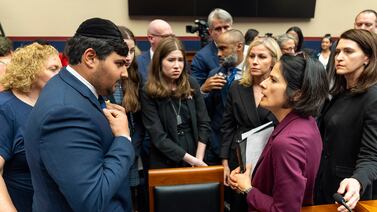Update: This bill was signed into law by Gov. Jared Polis on March 6.
Sign up for our free monthly newsletter Beyond High School to get the latest news about college and career paths for Colorado’s high school grads.
Colorado’s effort to help the more than 300,000 residents who never graduated high school has been on hold due to an oversight when the law expanding adult diploma programs was written last year.
But the state’s community colleges may soon be able to get the Adult Education and Literacy Grant Program started, thanks to a bill quickly moving through the legislature that fixes a technical problem that’s kept schools from moving forward with the program.
Senate Bill 51 would allow the State Board of Community Colleges and Occupational Education or a college district board of trustees to create a graduation standard. It would also roll over unspent money from the last year.
The program hit a snag because community college leaders were unsure who they should work with to create criteria for what adults should know to get their high school diploma. The program called for colleges to work with a school district, but the majority serve an area that includes numerous school districts — and college leaders said they wanted to be responsive to the needs of the region, not just one school district area.
In addition, Colorado does not have a statewide standard for what an adult should know to get a high school diploma.
“What we’re doing is we’re making a quick amendment that is needed for our community colleges and local district colleges to have the flexibility that they need in order to tailor their curriculum, as well as ensure that their curriculum aligns with the diverse needs of our adult learners,” said state Sen. Rachel Zenzinger, an Arvada Democrat who is co-sponsoring the bill, during an education committee hearing last week.
The program is meant to provide a boost to Colorado’s adult education programs.
Community colleges educate about half of the state’s adults trying to get a high school diploma.
But schools needed to work with multiple school districts to confer a degree. College leaders reported it became difficult to get students diplomas because districts focus on serving younger students, and when district leaders left, new ones weren’t always aware of the partnership. The program allowed colleges to set out on their own.
The program also tripled spending statewide on adults without a diploma.
Colorado was the last state in the nation to begin funding adult education when it created a grant program in 2014. Even with last year’s infusion of $2 million more a year for adult education programs — bringing the statewide total to $3 million — Colorado still funds its programs at some of the lowest levels in the country.
The hope from supporters is that the program will get more adults to good-paying jobs. On average, adults without a high school diploma earn about $682 a week, according to the Bureau of Labor Statistics. That’s compared to $852 a week for residents with a high school diploma.
Jason Gonzales is a reporter covering higher education and the Colorado legislature. Chalkbeat Colorado partners with Open Campus on higher education coverage. Contact Jason at jgonzales@chalkbeat.org.








